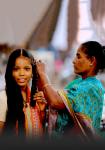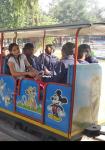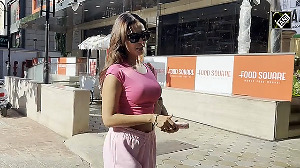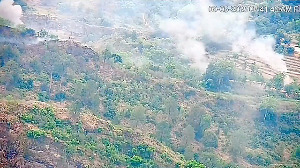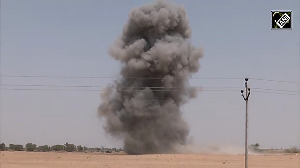The top brass of the Communist Party of India-Marxist met in New Delhi on Thursday to finalise its strategy on bringing together secular parties to target the government on the Nuclear Liability Bill and budget and to decide on the meeting of extended Central Committee slated later this year.
The two-day politburo meeting, which is being held at the AKG Bhavan, is being attended by party General Secretary Prakash Karat, M K Pandhe, Brinda Karat, Manik Sarkar and Pinarayi Vijayan, among others.
West Bengal Chief Minister Buddhadeb Bhattacharjee was not present at the meeting due to the ongoing state assembly session.
"The political situation will be reviewed and a strategy will be finalised. The meeting also will also decide on the venue of the extended Central Committee meeting to be held in August. We will also decide who all should be invited to it," Pandhe told reporters in New Delhi.
The extended CC meeting is being convened to decide on the political line since the CPM has postponed the Party Congress to 2012.
The meeting would review the progress made by the party in its inner-party rectification campaign, especially in states like West Bengal and Kerala.
Besides reviewing the prevailing political situation and the assembly polls in Bihar due later this year, the politburo will also finalise its tactics to unite all non-Bharatiya Janata Party outfits to corner the Congress-led coalition both inside and outside Parliament.
The party is planning to coordinate actively with the Opposition parties in Parliament to take on the United Progressive Alliance government, particularly on the rise in petro product prices and the overall increase in prices of essential commodities, during the remaining part of the Budget session of Parliament.
The CPM and other Left parties have expressed their clear intent to oppose the Civil Nuclear Liability Bill, saying that it was nothing but a huge hidden subsidy to the United States-based equipment suppliers and aimed at promoting private nuclear power plants.
Despite their opposition to the women's bill, the CPM has been making calculated efforts to forge unity with socialist elements like those in the Janata Dal-United, Samajwadi Party and the Rashtriya Janata Dal. Efforts are being made in this direction ahead of the assembly elections in Bihar slated in November.
Two days ago, Karat had called for unification between communists and socialists to forge a 'third force' in the national polity.
Referring to the erstwhile Congress Socialist Party in the 1930s which had leaders like Ram Manohar Lohia, Jayaprakash Narayan and veteran communist leader E M S Namboodiripad, he said after initially sharing the same platform, socialists and communists parted ways.
Maintaining that time was now ripe for them to unite, he had said, "In today's environment, it is important that a viable political alternative is available."


